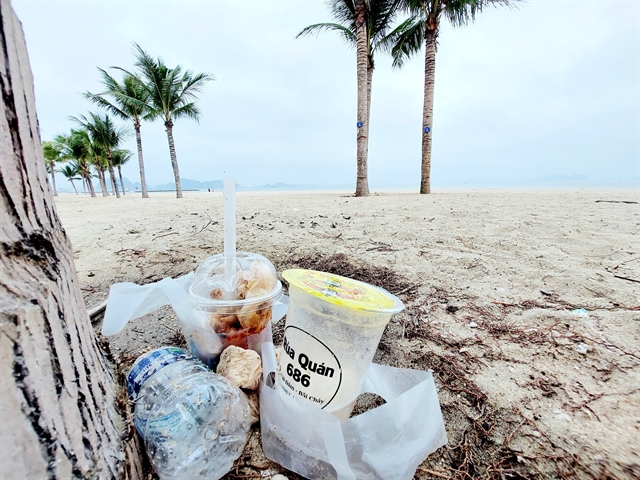A workshop was held in Ha Long City, the northern province of Quang Ninh, on Friday to promote public awareness of marine plastic waste and action against single-use plastic products in Ha Long Bay, a world natural heritage site.

Single-use plastic waste left on the beach of Ha Long City, Quang Ninh Province. — VNA/VNS Photo
An estimate in 2020 by the Ending Plastic Pollution Innovation Challenge (EPPIC) project showed that among over 28,280 tonnes of plastic waste released in the Ha Long Bay area each year, about 5,272 was discharged to the sea, and 34 tonnes of garbage came from tourism every day.
Patrick Haverman, deputy resident representative of the UN Development Programme (UNDP) in Viet Nam, said plastics account for an estimated 70-80 per cent of marine debris.
While many countries have made considerable efforts to fight plastic waste, challenges caused by marine plastics are transboundary.
Under a Norwegian Embassy-funded project on scaling up community-based models of domestic waste and plastics management, the UNDP has developed integrated, green, and equal models for improving the household waste management system.
He noted that it has also worked with the Ministry of Natural Resources and Environment to carry out the EPPIC project in four ASEAN countries: Viet Nam, Thailand, Indonesia and the Philippines.
Nguyen Van Duong, deputy chairman of the Quang Ninh Farmers’ Union, said environmental protection requires the engagement of the entire political system, society, businesses, and the community, adding that each people’s awareness is the most important factor.
He held that comprehensive solutions are necessary to mitigate plastic waste's adverse impacts.
Duong noted a project had been implemented in the areas bordering Ha Long Bay since 2020 to build community-based waste management, sorting, collection, and treatment model.
The project, funded by the UNDP, the Global Environment Facility, and the Norwegian Government, has helped improve local authorities, businesses and residents’ awareness and capacity.
At the workshop, participants shared views on marine environmental protection, the role of each organisation in boosting sustainable tourism, and activities carried out in localities to ease the impacts of tourism vessels and single-use plastic products on the environment.
The UNDP also debuted “Trash Hunt” (sanrac.undp.org.vn), a mobile app to report and monitor all indiscriminate dumping sites in Viet Nam so that local authorities, related parties, and residents can make a timely response.